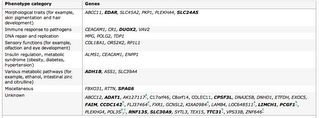|
Monday, February 04, 2008
I and others at this site have written much about recent human evolution, with a particular emphasis on papers that have used large-scale genotyping data on individuals from diverse populations to make inferences about regions of the genome that appear to be under natural selection. The sources of information used by these papers vary, and the logical chain from the observation to the inference of selection might be difficult for a non-specialist to follow.
So it's nice to be able to clearly state the logic behind a new paper scanning the genome for evidence of the action of natural selection: if an allele is at really high frequency in one population and really low frequency in another, that's interesting. To go into a slight bit more detail, the authors use the HapMap, a database of genotypes at >3 million SNPs individuals of East Asian, African, and European descent, and calculate Fst, a measure of how different allele frequencies are between the three broad continental groups. They hypothesize that, assuming population differentiation is driven by natural selection and not genetic drift, the most extreme SNPs should then be enriched for genic regions (as opposed to non-genic regions) and non-synonymous SNPs (as opposed to synonymous SNPs).  On the right is the moneymaker, showing exactly that--high Fst SNPs (ie. towards the right of the graphs) are enriched for both genic and non-synonymous SNPs. Interestingly, SNPs in the 5' untranslated region of genes are also highly differentiated, suggesting perhaps some role for gene regulation through microRNAs in recent human adaptations.  The authors compile a list of the genes most highly differentiated between the three human populations included in their study (also on the right), including many of the known suspects, including EDAR and SLC24A5. To me, the striking thing is the huge list of genes of unknown function--it's always humbling to realize how little is known about human biology. Humbling and of course exciting--someone's going to figure out what these genes do, and this study suggests at least some of the them play large roles in determining what makes human populations so diverse. Something to watch for... Labels: Genetics, Population genetics |



